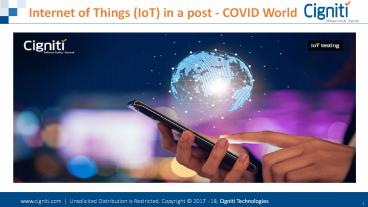Internet of Things (IoT) in a post-COVID world - PowerPoint PPT Presentation
Title:
Internet of Things (IoT) in a post-COVID world
Description:
Cigniti’s experience in IoT app Testing as a Service (TaaS), a team of IoT-skilled assurance specialists, and a robust IoT assurance infrastructure (labs, simulators, test racks, etc.,) support real-time quality assurance of Big Data, Compatibility, IoT Security, Performance, Pilot, Regulatory, Reliability, Upgrade, Usability, and smart devices in a dynamic environment (RFID, Sensors). – PowerPoint PPT presentation
Number of Views:311
Title: Internet of Things (IoT) in a post-COVID world
1
Internet of Things (IoT) in a post - COVID World
2
Internet of Things (IoT) in a post - COVID World
- COVID-19 has brought the whole world in the eye
of the storm and the impact it has had on our
society and economy is unprecedented. It has
driven enterprises to rethink the way they
operate and work. - According to McKinsey, Before the COVID-19
outbreak, 92 percent of companies had been
considering digital transformation of their
business models, but the crisis actually revealed
how vulnerable most companies are and how
urgently they require transformation. COVID-19
crisis is likely to significantly accelerate the
shift to digital and fundamentally shake up the
business landscape. - The effects of the pandemic on the global
economic recession are causing CXOs to
prioritize spending on services and technology
that are deemed mission-critical over
initiatives aimed at transformation or growth.
Investing in connected technologies is no more a
luxury, but a necessity for survival and business
continuity. - Need for resilient leadership in the face of
COVID-19 - It is imperative for enterprises to think ahead
to be in a state of readiness to resolve the
challenges due to the pandemic and protect the
future of the business. As a business, there is
no one size fits all solution to tackle this
situation. - Phase 1 Respond in which an enterprise deals
with the present situation and manages
continuity. - Phase 2 Recuperate during which an
organization learns and emerges stronger. - Phase 3 Flourish in which the company
prepares for and shapes the next normal.
3
Internet of Things (IoT) in a post - COVID World
- According to the latest IDC report, Across the
world, spending on software and hardware related
to IoT is projected to grow rapidly, from 726
billion in 2019 to 1.1 trillion in 2023. The
report further reveals that Asia-Pacific
accounted for most of the spending on IoT in
2019, with India spending 20.6 billion. - The rise of connected world is also expected to
bring challenges around ensuring that privacy
rights are respected while collecting and using
data, the captured information is used and stored
securely, and edge devices and sensors do not get
hijacked or become a threat vector. - The IoT platform can intertwine nimbly across
business sector platforms, raising security
concerns pertaining to the collected information
and effective management. The following are some
observations per industry analysis - Weak authentication/authorizations
- Lack of comprehensive management
- Lack of notification
- Periodic security upgrades and increased threat
vector - Use of default IoT parameters
- Data portability and interoperability issues with
vendor lock-in
4
Internet of Things (IoT) in a post - COVID World
IoT as a technology has been maturing for some
time and seems poised for continuous growth
globally. This growth is expected to be driven by
industrial sectors such as utilities,
manufacturing, agriculture, and infrastructure,
that are responding to massive changes in their
operating environment. To further accelerate
the adoption, technology providers, policy
makers, and industries need to work closely to
address the challenges. Cignitis experience in
IoT app Testing as a Service (TaaS), a team of
IoT-skilled assurance specialists, and a robust
IoT assurance infrastructure (labs, simulators,
test racks, etc.,) support real-time quality
assurance of Big Data, Compatibility, IoT
Security, Performance, Pilot, Regulatory,
Reliability, Upgrade, Usability, and smart
devices in a dynamic environment (RFID,
Sensors). Need help? Talk to our IoT
Assurance experts. They will help provide a
solution to your business and will demonstrate
how to overcome several IoT challenges in a
post-COVID world. Read more https//www.cigniti
.com/blog/internet-of-things-iot-post-covid
5































